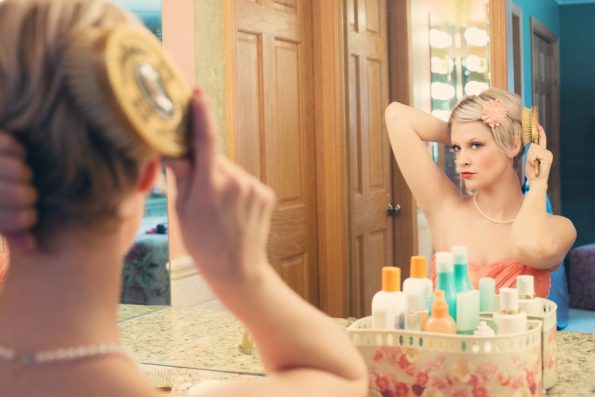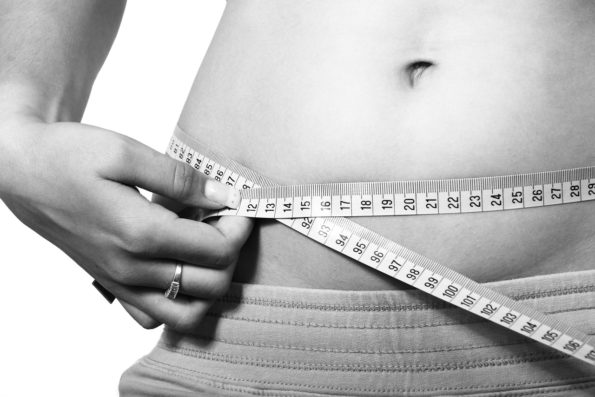[dropcap]I[/dropcap]’m a very high maintenance teenager. I’ve been this way since I came out of the womb quite honestly. Everyday myself, and many of my other teen counterparts wake up at the crack of dawn to get ready for school. I wake up at 4:45 am before school in order to get myself put together. I put on my makeup, do my hair, pick out an outfit all before my bus arrives at 6:32 am.
However, for some of us, this desire to be ‘perfect’ reveals a deeper insecurity.

Unfortunately, these insecurities don’t just affect how we look. They affect a more drastic segment of our life. Some people think it impacts our education and health. Now, it may sound elementary, but it is actually more complex than many of us believe. An article reported by HuffPost’s Barbara Greenberg explains, ” 20% of girls between the ages of 8 and 18 describe feeling unappealing, undesirable and simply not confident when they are not wearing makeup.” This means 1 of every 5 girls feels unsettled and insecure in her own skin. It is apparent that society has somehow convinced people that if they don’t fit the box of beauty standards they should feel insecure.
Our self-confidence is easily influenced. Whether it’s by our friends, family, or social media our opinions on ourselves change just as fast as the weather does. But it happens to affect our lives in more ways than one.
What the Hell-th?
Our self-confidence is easily influenced. Whether it’s by our friends, family, or social media our opinions on ourselves change just as fast as the weather does.
Self-esteem plays a big role in your mental, physical, and social health. Low self-esteem is often accompanied by anxiety and depression which can be a fatal blend.
Many psychologists agree that your self-esteem is the biggest determining factor of personality. Psychiatrist Dr. Kevin Solomons, who wrote the book Born to be Worthless: The Hidden Power of Low Self-Esteem explains that our self-esteem system guides our brain to make correct decisions based on values and what is right or wrong. What he also notes is that like any system, this system can make mistakes. When it does go wrong it can lead to depression, anxiety, and one of the biggest, eating disorders. A study done by the National Eating Disorder Organization concluded that 20 million women and 10 million men will develop an eating disorder in the United States alone. This study also showed that 40-60% of girls ages 6-12 express feelings of body dissatisfaction thinking they are too fat or too short.

Not only does self-esteem affect our physical health, it also affects our social health. Social health is defined as the way you talk and interact with other people on a day to day basis.
During Dove’s campaign to increase self-confidence they gathered research reporting 60% of girls ages 15-17 avoid daily activities like going to school, hanging out with friends, and even going to a doctor’s appointment all because they have low self-esteem. By not going out and avoiding social activities, it causes deeper rooted issues.
Our self-confidence is easily influenced. Whether it’s by our friends, family, or social media our opinions on ourselves change just as fast as the weather does.
Education Dedication; What are the Effects?
A school is a place full of opportunity. Unfortunately, some students miss out on these opportunities because of how they feel about themselves.
Dr. Ken Shore, a writer for Education World, explains that a student’s self-esteem impacts everything they do. It affects the way they interact, deals with struggles, and engage in activities. A low self-esteem can negatively influence a student’s desire to learn, causing them to reject information entirely.

A study done by Jennifer Crocker a psychologist at the University of Michigan’s Institute for Social Research studied 600 college freshman 3 times during the year to determine what students base their self-worth on. The study showed that 80% of students base their worth on their grades. The students who do base their worth on grades were shown to have a higher stress level and have grades similar to those who did not base their worth on their grades. “They feel motivated to do well in academics, but having their self-worth on the line doesn’t help their performance,” Crocker says.
A survey of students conducted by the University of Cape Town supports Crocker’s message. In this survey, they found that the fear of failing often lead to the procrastination and in turn causes a low self-esteem. Since the student procrastinates so long their work does not reflect their true skill, it only reflects the amount of time they had. With waiting to the last minute to study, they ended up not doing as well on tests and caused an even deeper spiral of low self-esteem.
[perfectpullquote align=”full” bordertop=”false” cite=”” link=”” color=”” class=”” size=””]Our self-confidence is easily influenced. Whether it’s by our friends, family, or social media our opinions on ourselves change just as fast as the weather does.[/perfectpullquote]
Although this evidence proves that our self-esteem can influence our schools, some refuse to think so.
According to Michael Alison Chandler, a writer for the Washington Post in her 2012 report, she believes that the way we feel has nothing to do with our academics. She explains that because of this epidemic, our students are being praised for absolutely no reason. In turn, students are receiving daily affirmations as well as awards ceremonies” that in her words “have few academic gains.” Chandler later goes on to explain that if we continue to give students “empty praise,” they will neglect to work through problems. Instead, they will give up because they know they will get affirmation regardless.
Spanish teacher Shar Hellie makes this same case.
Early in her teaching, Hellie would give constant encouragement. If they did not know the answer, she would coach them until they got it right. She soon realized that this was only giving students an easy out. They did not have to know the answer, they only had to wait until she told them the answer. Soon after, she made a change.
Hellie decided she would be more encouraging of students attempting to get the answer, rather than giving them empty praise for them getting the answers wrong. She has already seen improvement in the student’s retention of the information and test scores have skyrocketed.
Making a Change
Low self-esteem is something that plagues a large portion of youth. Self-esteem is often determined at a young age base on your experience as a child. The next step after recognizing the issue it to take steps to improve your life in a healthy way.
In a 2017 Psychology Today article therapist Kimberly Hershenson says, “Two key things I emphasize are to practice acceptance and stop comparing yourself to others.” She explains that comparison only leads to negative self-talk and in the long run, leads to worsened anxiety and depression. By comparing yourself to your peers, you start to convince yourself that they are better than you and that you’re worth less than them.
In the same Psychology Today article Dr. Jessica Koblenz adds, “Sometimes automatic negative thoughts like ‘you’re fat’ or ‘you’re lazy’ can be repeated in your mind so often that you start to believe they are true, these thoughts are learned, which means they can be unlearned.” These negative thoughts we produce are just that, thoughts. They have no significance and don’t define you as a person.

In order to increase self-confidence in children, the Do Something Organization launched a campaign in 2014. They started this campaign after doing a survey and found out that nearly 7 out of every 10 kids feel as though they don’t measure up to their peers physically and academically. The campaign promotes self-confidence by having students write positive messages on sticky notes. They then place them over the mirrors in the school bathrooms in hopes that children will read these notes and be able to look past any negative thoughts.
By visiting the Do Something website you can join the team and help spread positivity.
Featured Image by Pixabay

As someone who has struggled with confidence myself, I have this to say. Over the years I have learned not to “radically love” or “radically hate” myself. I’m a people-pleaser. I love making others laugh and to be happy. I want to be loved as much as the next person. But hating yourself does no good in fixing any problems you may face. Take the criticism people give, sort through the ones that are valid, and improve accordingly. Take it as a form of “Constructive Criticism” if you will. If you do that, and ignore the hate comments people spew just to put you down, your life should improve dramatically. Learn from your mistakes, take valid criticism to heart, and never stop trying to become the best you can be.